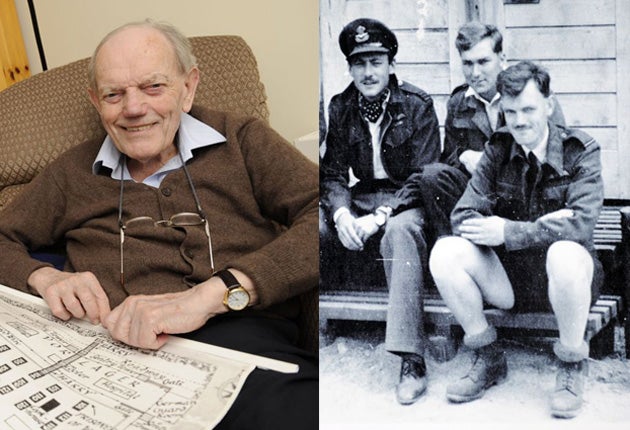Jack Harrison, last of the Great Escapers dies, aged 97

The last-known survivor of the attempt to break out from a German prisoner-of-war camp which became immortalised in the film The Great Escape has died at the age of 97.
Jack Harrison was one of 200 prisoners who hoped to escape to freedom through the tunnel codenamed "Harry" at Stalag Luft III in March 1944.
He was the 98th in line and was waiting his turn in Hut 104 to make his way through the tunnel, which would have taken him beyond the camp perimeter, when the alarm was raised and the break-out was halted.
Of the 76 men who made it out of the camp, only three managed to complete a "home run" by getting all the way back across Nazi-occupied Europe to Allied lines. Infamously, 50 of the recaptured prisoners were executed in an act of retribution ordered by Adolf Hitler himself.
The escape was turned into a Hollywood film in 1963 with a cast including Richard Attenborough, Steve McQueen and James Garner. It was based on an account by Paul Brickhill, an Australian Spitfire pilot shot down over Tunisia while serving with the RAF, who helped organise the break-out.
Mr Harrison was a Latin teacher at Dornoch Academy in Sutherland until he was called up, and joined the RAF where he trained as a pilot.
He was shot down on his first mission, bombing German shipping at the Dutch port Den Helder in November 1942. After being sent to the prisoner-of-war camp – he was told by one of the Germans who captured him: "For you ze war is over" – he joined in a plot to dig three tunnels. The tunnels were codenamed Tom, Dick and Harry but two were discovered by the guards before anyone could use them to escape. Mr Harrison was appointed the righthand man of Sqn Ldr Roger Bushell, the main organiser of the escape plot, and one of those executed when recaptured.
The former pilot officer, who learnt to speak German to help his escape prospects, recalled in an interview last year, following the death of his friend and fellow Stalag Luft III prisoner Alex Lees: "Harry was the only one that wasn't discovered by the Nazis, because its entrance was hidden underneath the stove. We'd carry the sand away in cardboard boxes and down the prisoners' trouser legs to dissipate it around the camp."
When the escape from Harry was halted Mr Harrison had to act quickly to burn his forged identity papers and to get out of the clothes he was supposed to escape in.
"I was to be a Hungarian electrician so I became Aleksander Regenyi, who was employed by a German firm," he said. "The prisoners from Block 109 were ordered to report to Block 104. It got pretty crowded, but their job was to occupy our beds to fool the Germans."
He added: "I guess it was a blessing in disguise I never made it through, as most were shot. But the main purpose wasn't just to escape. It was to outfox the Germans. It was a huge moral victory. It humiliated Hitler and gave the Nazis a bloody nose."
Mr Harrison spent his last years at Erskine veterans' home in Renfrewshire. Maj Jim Panton, Erkine's chief executive, said yesterday that Mr Harrison would be greatly missed by all of the staff and veterans in the home and that it had been a privilege and an honour to care for him.
After the war Mr Harrison was haunted by the death of his gunner Bill Aitkinson, the one member of his four-strong crew who died when his aircraft was shot down. The aeroplane crashed into the sea while weaving to avoid flak and Mr Aitkinson failed to get out. Pilot Officer Harrison blamed himself for "poor flying".
He returned to his wife Jean in Glasgow when the war ended and resumed his career as a teacher. In 1958 the family moved to Rothesay, where Mr Harrison was appointed director of education for the isle of Bute. He retired in 1975.
Mr Harrison’s son and daughter, Chris and Jane, said in a joint statement: “To others he was considered a war hero, but to us he was much more than that. He was a family man first and foremost as well as a church elder, Rotarian, scholar, traveller and athlete.
“He took up marathon running in his seventies to raise money for charity. He was a caring father and grandfather and he will be missed by the whole family. We are indebted to Erskine for the care and attention that he and we have received over the past two and a half years.”
Join our commenting forum
Join thought-provoking conversations, follow other Independent readers and see their replies
Comments